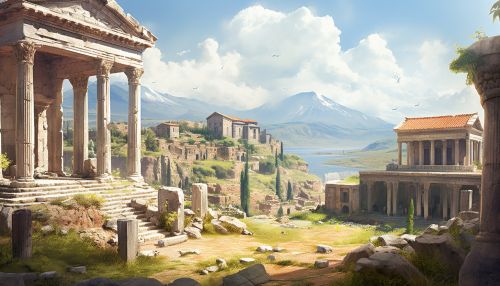Macedon
History
Macedon, also known as the Kingdom of Macedon, was an ancient kingdom on the periphery of Archaic and Classical Greece, and later the dominant state of Hellenistic Greece. The kingdom was founded and initially ruled by the royal Argead dynasty, which was followed by the Antipatrid and Antigonid dynasties.


The history of Macedon is characterized by its rise from a small kingdom at the periphery of classical Greek affairs, to one which came to dominate the entire Hellenistic world. This was achieved under Philip II, who brought most of the city-states of mainland Greece under Macedonian hegemony, in a federation called the League of Corinth. His son Alexander the Great, who succeeded him, went on to conquer the Achaemenid Empire, which stretched as far as Egypt and India, expanding the Macedonian Empire to its greatest extent.
Geography
Macedon was located in the northeastern part of the Greek peninsula, bordered by Epirus to the west, Paeonia to the north, the region of Thrace to the east, and Thessaly to the south. The kingdom covered approximately 25,000 square kilometers, and its capital was the city of Pella.
The geography of Macedon included a variety of landscapes, from the high peaks and deep valleys of the mountainous west, to the fertile plains of the east. The region was rich in timber, gold, and other natural resources, which played a significant role in the economic prosperity of the kingdom.
Economy
The economy of ancient Macedon was predominantly based on agriculture, with a significant emphasis on grain production. The kingdom was known for its fertile lands, particularly in the region of Pieria, which was renowned for its wheat fields. Other important agricultural products included wine, olives, and livestock.
In addition to agriculture, mining was another significant sector of the Macedonian economy. The kingdom was rich in mineral resources, particularly gold and silver, which were extensively mined and played a crucial role in the financing of the Macedonian army and the lavish lifestyle of the Macedonian court.
Trade also played a significant role in the economy of Macedon. The kingdom was strategically located along several important trade routes, which facilitated the exchange of goods with other regions of the ancient world.
Culture
The culture of Macedon was profoundly influenced by its interaction with the cultures of the rest of the Greek world, the Persian Empire, and the cultures of the eastern Mediterranean. These influences were reflected in various aspects of Macedonian culture, including its art, architecture, literature, and religious practices.
Macedonian art, for instance, was heavily influenced by Greek models, but also exhibited unique characteristics that distinguished it from the art of the other Greek city-states. Macedonian architecture, similarly, was a blend of local traditions and Greek influences, with the royal palaces of Pella and Aigai serving as prime examples of this synthesis.
